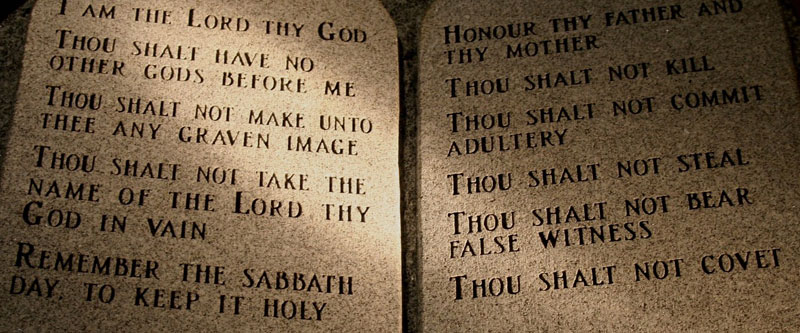Stephen R. Covey’s book, The 7 Habits of Highly Effective People, is a well-known source of wisdom for those in the world of business. Although the book is mostly self-help and pop psychology, many of the principles are gems from the realm of God’s common grace, truth accessible to believers and unbelievers alike. One of the book’s lessons has always gripped me: Begin with the end in mind. This means that highly effective people are goal-oriented. They know what they want to accomplish, and they tailor everything in life to achieve that goal. Well, this is certainly a biblical concept. We are called by God to live our lives with a teleological mindset. Since God created the world for His glory, life has a goal, an end. Students of the Westminster Shorter Catechism know the goal well. “Man’s chief end is to glorify God and enjoy Him forever.” When it comes to the doctrine of salvation, glorification is the ultimate goal of God’s saving work in our lives. It should astound us that God saved us so that we might be glorified.
Glorification is the final link in the golden chain of redemption. “And those whom He predestined He also called, and those whom He called He also justified, and those whom He justified He also glorified” (Romans 8:30). God saves His people, effectively bringing all His elect from grace to glory. In context, this glorification is to be fully conformed to the likeness of Jesus Christ (Romans 8:29). Jesus Christ fully reveals the glory of God as the image of the invisible God (Colossians 1:15), and He is the pattern into which God will weave the tapestry of our lives. All other saving benefits (election, calling, regeneration, justification, adoption, sanctification) are aimed at this goal: the glorification of the redeemed sinner. This is where God is taking us.
When Jesus looked into heaven as our great High Priest and prayed for all His people, he said, “Father, I desire that they also, whom You have given me, may be with me where I am, to see my glory that You have given me because You loved me before the foundation of the world” (John 17:24). How we need to grasp the sublime joy of Christ’s prayer for us! The Father and Son enjoyed a loving fellowship in eternity past. God the Son beheld the glory of His Father in perfect beatific vision. There wasn’t the slightest break in the integrity of that divine fellowship. And yet Jesus prays that we might share in that glorious fellowship and vision. Glorification entails being with Jesus where He was before the foundation of the world. It means that we share in the fellowship of the Trinity, basking in the glory of the great salvation Christ won for us at the cross.
Again, this glorification is the goal of Christ’s saving work. “But we see Him who for a little while was made lower than the angels, namely Jesus, crowned with glory and honor because of the suffering of death, so that by the grace of God He might taste death for everyone. For it was fitting that He, for Whom and by Whom all things exist, in bringing many sons to glory, should make the founder of their salvation perfect through suffering “ (Hebrews 2:9-10). If we ask, “Why did Jesus come from heaven to earth, become a little lower than angels, and suffer on the cross?” The answer is ready: “to bring many sons to glory.”
Like election, calling, regeneration, justification, adoption, and sanctification, glorification is the result of the free grace of God. When we arrive in heaven and are “saved to sin no more,” we will praise God for His grace to all eternity. Not one beam of our glorified state with shine from man’s merit. It is a reflected glory. God is like the sun, and we are moons. All the glory comes from Him and goes to Him. Our glorification is not the result of man’s cooperation. If it was, man would have grounds for boasting. However, we shall be glorified by free grace “so that in the coming ages He might show the immeasurable riches of His grace in kindness towards us in Jesus Christ” (Ephesians 2:7). It will take an eternity of ages to exhaust the inexhaustible grace of God! “When we’ve been there ten thousand years, bright shining as the sun, we’ve no less days to sing God’s praise than when we’ve first begun.” When Jesus returns and our glorification is complete, it shall only be on account of the fact that He comes with grace. This is why we are told to set our hope fully on the grace that will be brought to us at His Second Coming (1 Peter 1:13).
Glorification comes in two stages. Taking our cue from the Westminster Shorter Catechism, we understand that we receive certain benefits at death and others at the resurrection.
“What benefits do believers receive from Christ at death? The souls of believers are at their death made perfect in holiness, and do immediately pass into glory; and their bodies, being still united to Christ, do rest in their graves, till the resurrection” (Shorter Catechism, Q. 37).
The first stage of our glorification is the glorification of our soul immediately upon death. When the believer dies, he instantaneously passes to the realm of the “spirit of the righteous made perfect” (Hebrews 12:23). Sanctification is now complete. Sin is gone. Holiness has ripened into perfection. We must stress the fact that this happens immediately upon death. There is no layover in purgatory. Jesus told the thief on the cross, “Today you will be with Me in Paradise” (Luke 23:43). Elsewhere Paul makes it clear that to be absent from the body is to be present with the Lord (2 Corinthians 5:6, 8). The Scriptures tell us very little about this intermediate state (the state of the soul after death but before the resurrection). However, we can be sure that it is “far better” (Philippians 1:23) because we are with Christ.
Years ago my wife and I went to visit her brother and his family in Bucks County, Pennsylvania. While we were there, I insisted that we take a trip to Princeton Cemetery in Princeton, New Jersey. I wanted to see Jonathan Edwards’ grave. Well, not far from where I found Edwards’ grave was the resting place of Charles Hodge (1797-1878), the great Calvinistic theologian of old Princeton. And the inscription on his tombstone: “To be absent from the body is to be present with the Lord.”
But the benefits of glorification are not complete at death. There is more. . .
“What benefits do believers receive from Christ at the resurrection? At the resurrection, believers, being raised up in glory, shall be openly acknowledged and acquitted in the day of judgment, and made perfectly blessed in the full enjoying of God to all eternity” (Shorter Catechism 38).
God’s saving work in our lives is holistic. God redeems us body and soul. Although the Fall brought mankind into an estate of sin and misery, God’s grace restores nature. Salvation is re-creation; God makes all things new (Revelation 21:5). This means that the perfection of soul that happens immediately upon death doesn’t bring the work of salvation to an end. God desires to restore our bodies and vindicate our persons at our public acquittal at the Day of Judgment. This is when “the righteous will shine like the sun in the kingdom of their Father” (Matthew 12:43).
The glorification of soul happens immediately at death; the glorification of our bodies happens at the return of Christ and general resurrection. “For since we believe that Jesus died and rose again, even so, through Jesus, God will bring with Him those who have fallen asleep. For this we declare to you by a word from the Lord, that we who are alive, who are left until the coming of the Lord, will not precede those who have fallen asleep. For the Lord Himself will descend from heaven with a cry of command, with the voice of an archangel, and with the sound of the trumpet of God. And the dead in Christ will rise first. Then we who are alive, who are left will be caught up together with them in the clouds to meet the Lord in the air, and so we will always be with the Lord” (1 Thessalonians 4:14-17). This passage makes clear that when Jesus returns, He will raise the dead. Those believers who are alive when He returns will be instantaneously changed. This change is described as occurring “in a moment, in the twinkling of an eye, at the last trumpet” (1 Corinthians 15:52). Here the perishable puts on imperishable and the mortal, immortality (1 Corinthians 15:53).
The nature of this resurrection body is the subject of large chunk of 1 Corinthians 15 and is a topic large enough to be covered in a separate study. Suffice it to say, though, that this resurrection body is a real physical body. Paul does indeed refer to it as a “spiritual body” in 1 Corinthians 15:44, but Paul doesn’t use the word “spiritual” to mean non-physical. Instead, it means permeated by the presence of the Holy Spirit. Our resurrection bodies will be free from sin and all the effects of sin. Our resurrection bodies will be incapable of sin, sickness, disease, aches, pains, and death.
In terms of glorification, we will be part of the show when Christ reveals His glory on the last day. “When Christ who is your life appears, then you also will appear with Him in glory” (Colossians 3:4). Our glorification is not inherent. At the same time, we shall share in the glory of Christ by way of reflection. We shall appear glorious only in Him. Like all the other saving benefits, our glorification is through our union and communion with the Lord Jesus. The Apostle of love tells us that “when He appears we shall be like Him because we shall see Him as He is” (1 John 3:2). The Second Coming in conjunction with the Beatific Vision instantaneously transforms all the elect of God. And this hope of glorification is an incentive to holy living for John continues: “And everyone who thus hopes in Him purifies himself as He is pure” (1 John 3:3). We should daily live, then, with an awareness of our blessed future. “Our citizenship is in heaven, and from it we await a Savior, the Lord Jesus Christ, who will transform our lowly body to be like His glorious body, by the power that enables Him even to subject all things to Himself (Philippians 3:20-21).
Since glorification is God’s work, it’s a sure work. The power that enables Him to subject all things to Himself is the same power that He will utilize to save us completely from sin and sin’s effects. He shall not fail to bring us from grace to glory. “And I am sure of this, that He who began a good work in you will bring it to completion at the day of Jesus Christ” (Philippians 1:6). Let us never forget that God began the work, and God shall complete the work. He finishes all His projects. He never fails to accomplish any of His purposes. And this is greatest of all God’s purposes. It is, to borrow a line from Jonathan Edwards, “the end for which God created the world.” This is goal of the entire created universe. It is why the whole creation is groaning for the revealing of the sons of God (Romans 8:19, 22). God is seeking to glorify Himself by saving a people for Himself, and He shall bring that people from grace to glory. SDG







